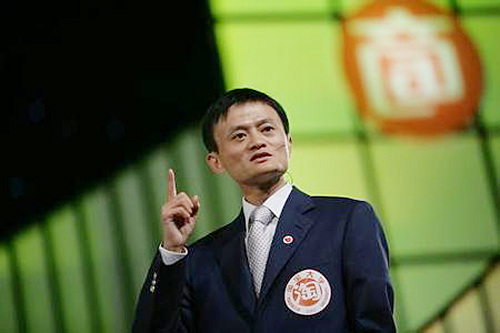|
 |
|
Alibaba founder Jack Ma attends a roadshow presentation in early September (SINA.COM) |
Alibaba Group Holding Ltd., the Chinese e-commerce behemoth that rivals Amazon and eBay, may shortly become the third most valuable Internet company traded in the U.S. (after Google and Facebook). Alibaba is seeking $162.7 billion in its New York Stock Exchange IPO, and could raise as much as $21 billion, according to a recent regulatory filing – the largest listing in U.S. history.
China is now well established as a major power in the Internet-driven future. While many Americans may be unfamiliar with the brand, a good portion of China's 642 million Internet users – about double the total U.S. population -- favors Alibaba. And the market still has room to grow. The company has already invested in six U.S. startups, and is building an American online marketplace called 11 Main. Wall Street is eager to snap up shares of the company, seeing it as their best chance to buy into China's growth. Online shopping in China is expected to grow at an annual rate of 27 percent, according to iResearch Consulting Group.
The U.S. has much to learn from the meteoric success of Alibaba and its founder Jack Ma. The company has learned from its U.S. counterparts and avoided some of their pitfalls. Unlike eBay, sellers on Alibaba's Taobao site do not pay a fee. Instead, revenue is generated through advertising and extra services, helping Taobao to attract 58 million small- and medium-sized retailers in addition to millions of amateur sellers. The company offers payment on delivery, a key factor to winning Chinese consumers' trust.
Alibaba doesn't just link buyer and seller as eBay does, or sell to consumers like Amazon, or orchestrate payment fulfillment like PayPal – it does all of the above.
"People keep on asking me what's the difference between Amazon, eBay and Alibaba. I would say Amazon and eBay are e-commerce companies and Alibaba is not an e-commerce company," Ma said as he kicked off a global roadshow this week to raise capital. "Alibaba helps others to do e-commerce. We do not sell things. We call ourself a company designing a platform, a company that is running an ecosystem."
Alibaba has also diversified. While most of its profits come from its eCommerce business, most of its growth over the past few years has been from buying up existing companies. Ma recently bought a soccer team, a bank and a money management firm in China. Market experts expect the buying spree to continue worldwide.
"India is a huge battleground. Amazon just announced they're going to spend $2 billion to compete there. Alibaba will definitely look for growth, not necessary in the West, but in the economies whose Internet economies are just beginning to accelerate," said Brad Stone, of BusinessWeek.
The listing of Alibaba heralds the new era of global commerce. China has firmly taken its place with a global brand, and an army of middle class consumers to shift buying power to the East. The door that Alibaba is opening swings both ways. The company will raise billions in funding from the West, and global manufacturers will increasingly target Alibaba's growing customer base. Already, we see companies like Apple and Starbucks adjusting their products to target Chinese consumers. The age of the Chinese consumer is at hand.
The implications of China's dominance in the global economy are many. As the world's biggest customer, what responsibilities does China have in terms of ethical trade, labor conditions, environmental impact and the use of natural resources? Chinese consumers have the power to change the world. It's not enough just to consume – China has to lead.
Google was founded under a tongue-in-cheek slogan: "Don't be evil." Alibaba would do well to follow a similar creed. As the company matures, it must now follow the guidelines of corporate social responsibility. As the labor market for the world, China already knows the dangers of unchecked profit maximization. Now is Alibaba's chance to establish a new precedent.
The era of the informed, ethical consumer has arrived. In a recent survey by Penn Schoen Berland, 82 percent of consumers in China indicated that they are willing to spend more on green products and services. If Alibaba truly wants to be a market leader, it will anticipate these ethical needs of its customer base and influence the market in a positive direction.
The author is a columnist for Beijing Review, living in New York City | 